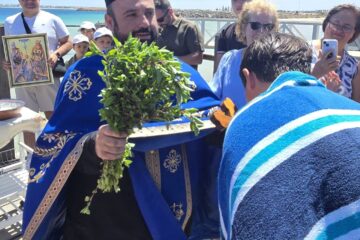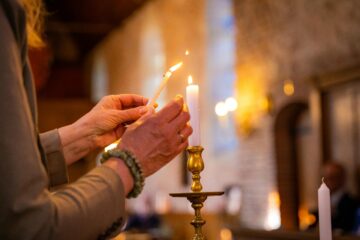Metropolitan of Pisidia Sotirios †
In today’s Epistle, Saint Paul calls hope ‘a sure and steadfast anchor of the soul’. A ship without an anchor runs the risk of being dashed against the rocks along a coast. When people without hope are faced with the adversities of life, they’ve got nothing to lean on. What an anchor is for a ship, or air for the lungs, hope is for our spiritual existence. Hope is the anchor of the ship of life.
Hope becomes our support in times of sorrow and of trials, of pain and failure. Hope urges our tired footsteps forward, illumines the dark and uncertain path of life and expels confusion, stress and turbulence from our heart.
Naturally everywhere we turn our gaze around us, or even within us, everything’s a disappointment. But the hope of the faithful isn’t groundless. It’s not utopian (utopia= nowhere). It’s founded on an unshakeable place. That place is the love of God, which is always there, even if it’s hidden behind the trials of life. The faithful see through to this love of God, as if it were the sun behind clouds of sorrows. In overcoming their frustration, they acquire strength for their struggle. It is precisely this confidence in the love of God which is fortified by hope.
Saint John the Sinaite notes that ‘Love is begotten from the knowledge and experience of the gifts of God’ (Ladder, Discourse XXX, On the connection between the trinity of virtues: love, hope and faith ). The faithful have this experience in their lives, but, as Saint Basil the Great adds ‘it is hope that makes joy reside with it in the soul of the courageous’ (Discourse on the Eucharist, PG 31, 224 BC).
Joy is absent among people today, despite all the ways we have of relaxing. So many people today suffer from depression. The faithful, however, reach that magnificent point of rejoicing in their sufferings (Col. 1, 24). This is a strange thing to say, which, if it didn’t come from Saint Paul, would be considered an absurdity or even, why not, an unnatural state of mind.
But for the faithful, even the Apostle of the Gentiles ‘rejoicing in hope’ (Rom. 12, 12) becomes reality. People of hope continue to sing hymns to God, even if the ground under their feet is quaking. Like an nightingale which continues to sing, even if the branch it’s sitting on snaps, because it still has its wings. The faithful have the wings of hope. People of hope ‘acquire wings like an eagle, run without becoming faint, and walk without becoming weary’ (Is. 40, 31).
Those who place their hope in God are never wrong to do so and never sink into despair. Because they have wings of hope And ‘hope does not put to shame’ (Rom. 5, 5). The source of the hope of the faithful is the living God. The unshakeable rock.
Source: pemptousia.com




0 Comments